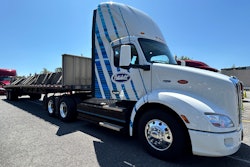Surface Transportation Board on May 7 issued a decision regarding motor carrier bureaus that would, among other things, eliminate antitrust immunity for the National Classification Committee’s classification-marking activities, effective Sept. 4. The NCC is an autonomous body of the National Motor Freight Traffic Association (NMFTA), which provides shippers and carriers a standard on which to base pricing negotiations. NMFTA and NCC said they will respond to the STB ruling, adding that some modification of the existing process might be required. For more information, visit this site.
A lawsuit filed in the U.S. District Court in New Jersey alleges a price-fixing conspiracy by five major U.S.-based railroad freight haulers: CSX Transportation, Norfolk Southern, BNSF Railway, Union Pacific and Kansas City Southern. The suit, filed by Phoenix-based Dust Pro Inc., contends that the railroads have conspired since mid-2003 to fix the prices of rail fuel surcharges applied to freight shipped at unregulated rates.
U.S. Supreme Court upheld local “flow control” ordinances in two central New York counties requiring private haulers to obtain permits to collect solid waste in the counties imposing the ordinances and to deliver waste to the state-created Oneida-Herkimer Solid Waste Management Authority. In 1994, the Supreme Court struck down a flow control ordinance that required haulers to deliver waste to a particular private processing facility, but the court ruled the key difference in the latest case is that a state-created public benefit corporation owned and operated the facility. (Case No. 05-1345)
Q We are an insurance agent for motor carriers in the Gulf Coast area. After Hurricane Katrina, carriers were left to deal with huge cargo claims, per occurrence limitations in their cargo policies and the question of how the “Act of God” defense applies. Even if they could raise their per occurrence limits, would carriers be afforded meaningful protection if the same thing happened again?
A This is a compound question involving two issues: (1) When does the Act of God exception apply? (2) Would upping a motor carrier’s cargo limit afford any protection under the circumstances?
Qualifying for the Act of God exception is a two-prong test. First, there must have been an Act of God that is the proximate cause of the loss. The term “Act of God” cannot be applied to a gust of wind or heavy rain; the defense typically is reserved for weather conditions of epic proportion – tornadoes, hurricanes, blizzards, hail the size of golf balls, etc. Clearly, Katrina as a natural disaster would qualify, and since the hurricane caused the waves that broke the levees and flooded the city, proximate cause was established.
The second prong of the defense, though, requires the carrier to show it was free from negligence. While it was pretty well conceded that the people in New Orleans did not have notice or time to react to the levee break, it could be argued that non-negligence often is not the case. For example, if a carrier stores loaded trailers in a flood-prone area and then does not take reasonable steps to move them when an evacuation notice is issued, it could be argued that the reasonable man standard is violated and the carrier’s negligence defeats the defense.
The insurance aspect of your question poses some additional considerations. Typically cargo policies exclude damage due to wetness, moisture and rust. If the carrier’s policy has this kind of exclusion, it may get coverage added back by a windstorm peril provision, but do not assume coverage.
Yet if a loss results from a natural disaster that qualifies as an Act of God, and you have a true legal liability policy or one that at least covers the peril involved, then one would think you would have coverage under the policy if your negligence precluded the Act of God defense and you were found liable.
In sum, I think my advice is pretty basic: (1) Don’t store trailers in a flood plain or below sea level if you can help it; (2) exercise reasonable prudence in evacuating and protecting the shipper’s goods against inclement weather; and (3) be shy about warranting coverage for more than the common law standard requires. After all, if the cargo loss to the shipper is actually a casualty loss of epic proportions that isn’t your fault, isn’t the shipper better served to seek indemnity from his insurer than to come after you?
OOIDA settles with movers
Owner-Operator Independent Drivers Association reached an $8 million settlement of its class-action lawsuit against Allied Van Lines and North American Van Lines for alleged violations of the compensation and chargeback disclosure provisions of the federal truth-in-leasing regulations. The settlement requires Allied and North American to pay $8 million over two years to about 6,000 owner-operators who leased equipment and services to Allied after May 5, 2000, and to North American after March 2001. Similar litigation is pending against Mayflower Transit and United Van Lines.
Court: Covenant can’t waive workers’ comp
Covenant Transport no longer can ask its employees to sign paperwork stating they waive their rights to seek workers’ compensation, according to court documents. The Tennessee Department of Labor and Workforce Development took the Chattanooga-based company to court after it learned of the practice.
In an order signed April 24 in Hamilton County Chancery Court, Chancellor Frank Brown III declared Covenant’s waiver void, relieving the company of none of its obligations under state workers’ compensation law.
According to court documents, the company agreed to stop using the forms or any similar documents. It also agreed to contact any past or present employees presented with the waiver to inform them that their rights are unaffected, whether they signed or not, and agreed to give current employees a summary of their rights under state workers’ compensation law. When these provisions are satisfied, the court will issue a final order dismissing the matter, the order read.
Covenant officials did not return phone calls seeking comment.
– Jill Dunn









